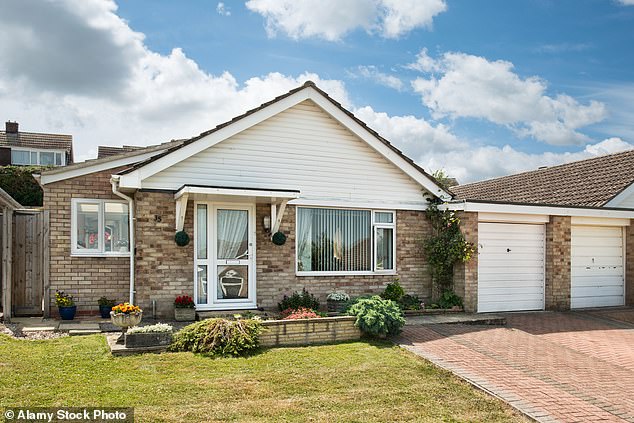
You might imagine the most popular property searches today would be for a city centre apartment or a family friendly house in the suburbs.
But in fact the answer is the humble bungalow — the single-storey home that’s enjoying a new lease of life.
Research by Confused.com Mortgages shows the proportion of internet searches for single-storey properties has soared by 53 per cent in 20 years, while DIY-ers are taking to social media to show off their modern twists on the traditional bungalow.
There are more than 100 million TikTok views for videos about refurbished bungalows and 129,000 Instagram reels and posts tagged #bungalowrenovation.

Back in fashion: Bungalows often have large gardens and offer privacy. Increased competition from older and younger buyers, vying with developers, means prices are soaring
There are a few places where bungalows are plentiful — in East Lindsey, Lincolnshire, for example, almost 24,000 of the 71,280 homes are bungalows — but in most locations they are becoming increasingly rare as developers snap them up, send in the bulldozers and build larger properties in their place.
Just 1,833 bungalows were built in the UK in 2019/20, equating to only 1 per cent of the total number of homes constructed.
The reason for this is most builders want to maximise profits from a plot of land by building a large house or block of flats.
Nick Cunningham of Stacks Property Search, a buying agency, says: ‘There’s huge demand for bungalows, especially from those looking to avoid the expense of moving again when they’re older. “We’re only interested in looking at bungalows” is something I’m hearing more often.’
Jeremy Leaf, former chairman of the Royal Institution of Chartered Surveyors, adds: ‘There’s a strong aspiration to buy a bungalow from those downsizing because a two or more storey house may not suit their lifestyle, yet they’re not ready to live in a flat. A bungalow is a halfway house.’
Lateral living is no longer just for downsizing or retirees but is an active lifestyle change for increasingly younger buyers
Charlotte Moxon, Strutt & Parker
Experts say a bungalow with a high roof ridge line offers potential for two bedrooms and a bathroom on the ‘first-and-a-half’ floor — ideal for visiting family.
Just before the pandemic, a survey by retirement housing firm McCarthy & Stone found that 60 per cent of over-65s would consider moving to a bungalow.
This is an amazing success story for a type of home that first appeared in this country 100 years ago.
Bungalows began as huts built by 19th-century Indian peasants; they were spruced up during the Raj to house British officers; then they came to Britain in the 1920s.
After World War II, they were considered good quality, low-cost homes, superior to ‘pre-fabs’, and became the housing equivalent of a national treasure.
Many agents now report the bungalow enjoying a 21st-century renaissance with completely different types of buyers.
‘Single-storey new homes are more interesting architecturally and have far better energy efficiency than bungalows built in the 1960s.
‘Lateral living is no longer just for downsizing or retirees but is an active lifestyle change for increasingly younger buyers,’ explains Charlotte Moxon of the Strutt & Parker estate agency.
Bungalow prices on the rise
Increased competition for bungalows from older and younger buyers, vying with developers, means prices are soaring.
Confused.com says the typical London bungalow price is £606,000 — a third more than the average £446,000 for a purpose-built flat or maisonette — while in the South West, a bungalow at an average £389,000 is approaching twice the regular apartment cost.
Despite high prices, bungalows are relatively affordable when compared to family houses, so they are being seized upon by more imaginative young buyers.
‘Detached bungalows have fewer supporting walls, so owners feel like they’re living open-plan.
‘They also offer escape from noisy neighbours in semi-detached and terraced homes’ says Confused’s mortgage expert, Claire Flynn.
Experts predict the homes will become a buy-to-let choice for investment buyers as the age profile of renters ramps up.
The bungalow has reinvented itself with new demographics — and in doing so has become the coolest property to live in.

